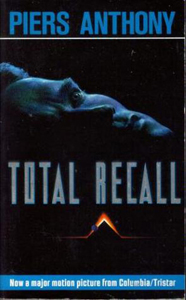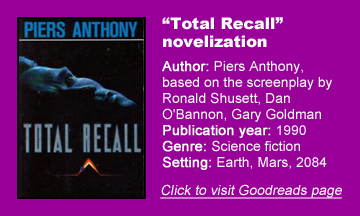The “Total Recall” novelization (1990) by Piers Anthony is the only instance of a Philip K. Dick story being adapted into a movie and then back into book form. Dick famously declined to write a novelization for “Blade Runner,” instead insisting that “Do Androids Dream of Electric Sheep?” be reissued.
And other than this one, no PKD film adaptations have been novelized; instead, Dick’s novel or short story collection is often reissued with a tie-in cover.
‘Wholesale’ Easter eggs
So does Anthony give us a hint of what a novel-length “We Can Remember It For You Wholesale” (1966) would be like? Not even close. Despite sharing Dick’s status as a prolific SF novelist, Anthony’s writing style is very different as he tells the movie story in straightforward fashion.
He includes some “Wholesale” Easter eggs, like a reference to Rekall manager McClane’s “Martian frog-pelt gray suit” (chapter 5), and McClane’s quote to a client that “we can remember it for you wholesale” (chapter 7). And one instance of “Quail” — instead of “Quaid” – makes it into the final text of the US edition (chapter 8).
But Anthony writes in a young-adult style, including an annoying amount of exclamation points as we’re privy to Doug Quaid’s internal journey. There’s none of the mind-trippery we’d get if PKD were writing this.
Just the opposite: Anthony crisply and clearly (and repetitively) explains Quaid’s bizarre situation wherein he is always Quaid yet the fighting skills and vague remembrances from his buried persona as Hauser sometimes emerge.
It’s as if Anthony is working through this bizarre situation on his own, and when a detail strikes him as amazing, he adds an exclamation point. But it’s all on the surface; he translates what Quaid is thinking and learning, but not what he’s experiencing on an emotional level, other than the fear and adrenaline of the chase.
Guidebook to the film
While there’s little in the “Total Recall” novelization to interest PKD fans, it does have value as a guidebook to the famously (or infamously) complex film written by Ronald Shusett, Dan O’Bannon and Gary Goldman. The book allows us to slow down and absorb what’s happening in Quaid’s mind and in the plot and world-building.
The most valuable chapter is 21, wherein Quaid re-experiences (via holding hands with Kuato) Hauser’s visit to the pyramid of the No’ui aliens. In this vision, Quaid gains total understanding of the No’ui’s terraforming machine and their reason for putting it on Mars. Even scholars of director Paul Verhoeven’s “Total Recall” couldn’t absorb this from the film proper.
Anthony’s prose is unavoidably clunky, because he’s writing about someone experiencing knowledge third-hand (or fourth-hand? It’s hard to keep track). At any rate, Quaid’s handprint on the machine’s console will be able to launch the terraforming because he means well: He desires a good life for the human colonists. The evil Cohaagen’s handprint would trigger destruction of the entire solar system (and therefore humanity) because his aims are self-serving.

That’s not fair to the rest of humanity, but Anthony never strictly claims the No’ui are fair; indeed, he points out that they are a literalist species, incapable of understanding figurative language or concepts. And I suppose one could argue this alien race aims to reward the human race for breaking free of its shackles.
If it can’t do that, its existence will continue to be miserable (except for the rulers) and that misery might spread, so it’s better in the long run that humanity be destroyed.
Some hard SF
Anthony peppers in some hard SF, something PKD would never do, such as explaining the atmosphere, gravity and geological history of Mars. And we see Quaid’s space journey to Mars when he’s in the fat lady disguise; this is absent from the film in order to preserve the surprise for the audience that Quaid is in that costume at the Mars spaceport.
Especially during the conclusive action, Anthony has a hard time reconciling the innocent Everyman nature of Quaid with his violent action-hero status. It doesn’t ring true that the book’s Quaid would spout one-liners while viciously killing bad guys – even though Anthony explains better than the film does that this is the Hauser secret-agent personality emerging.
It’s also rather amusing that — in order to get exposition to the reader — Quaid mansplains to Melina almost everything that’s going on, including specifics about the nature of Mars, even though she lives on Mars and he does not. Quaid loves Melina because she’s a woman who can think and act for herself, yet he has 90 percent of the hero moments. “Total Recall” thinks about being progressive in its portrayal of Melina, but can’t commit.
The lack of a PKD feel is disappointing but expected, and the YA writing style is simply disappointing. That said, Anthony’s “Total Recall” novelization is an effortless reading experience, and it’s your prime source for understanding the details of the convoluted storyline and what it means on the inside for Quaid.
Out of all the movies based on PKD works, “Total Recall” most benefits from a novelization, and I’m glad we have one.


